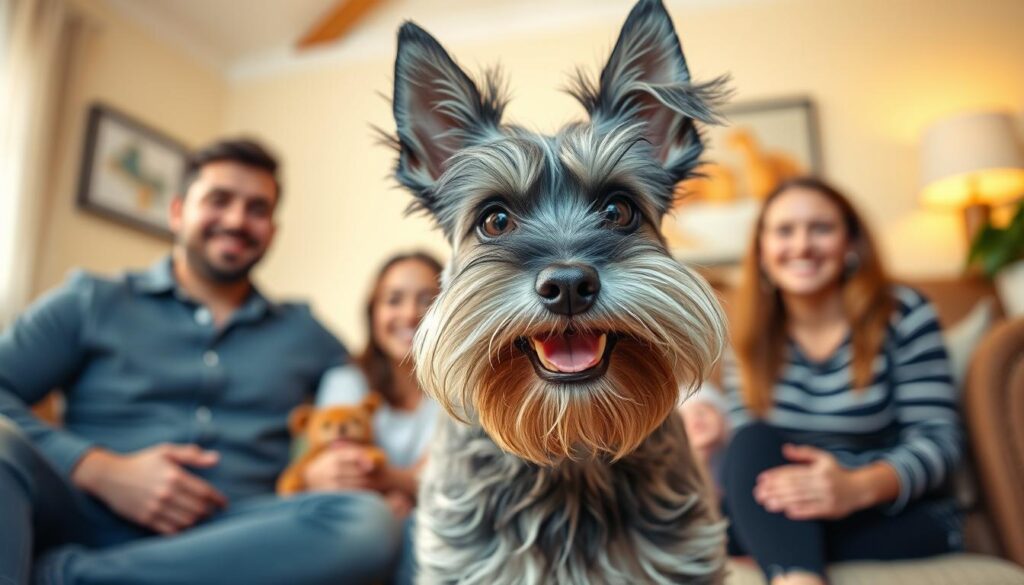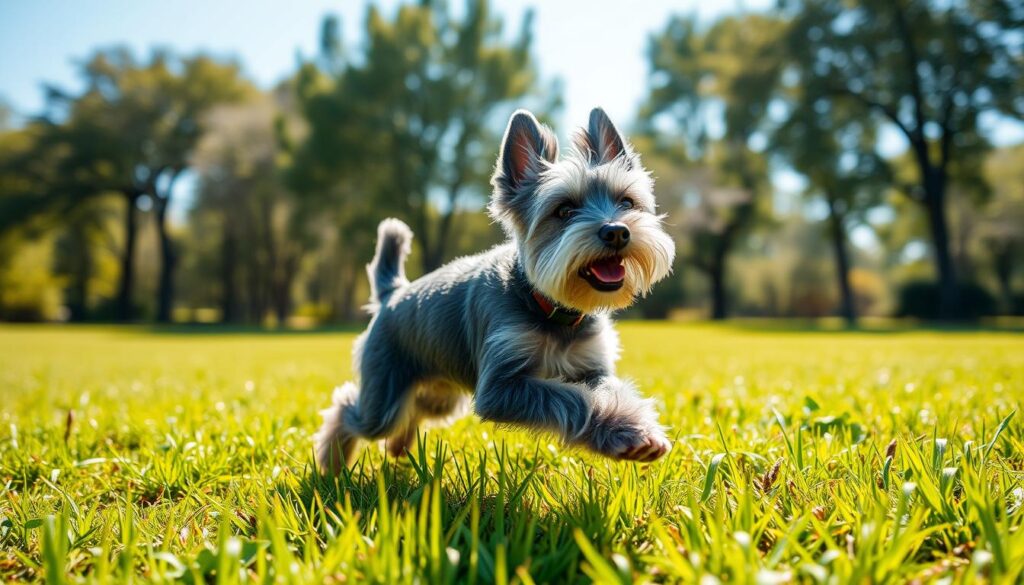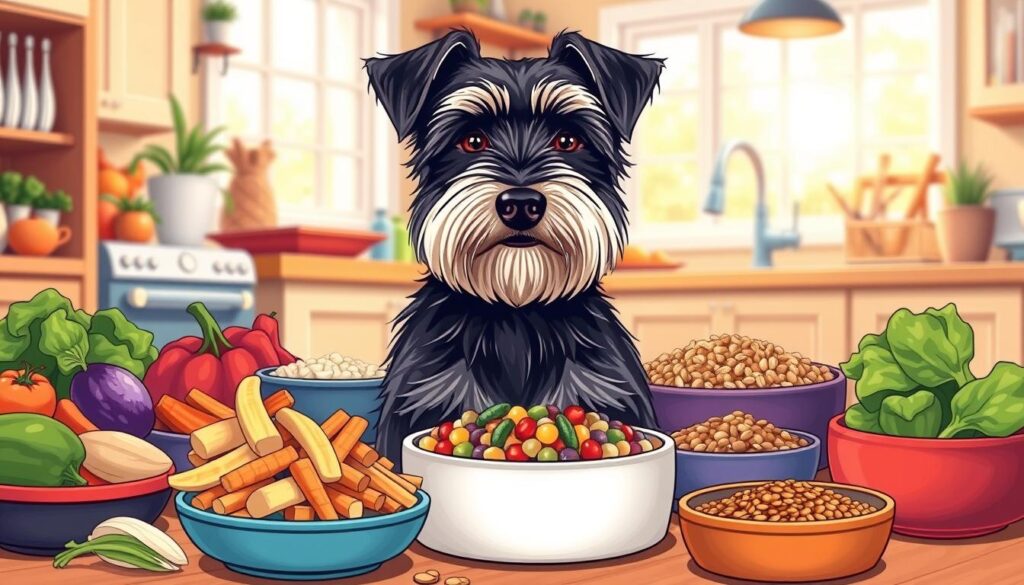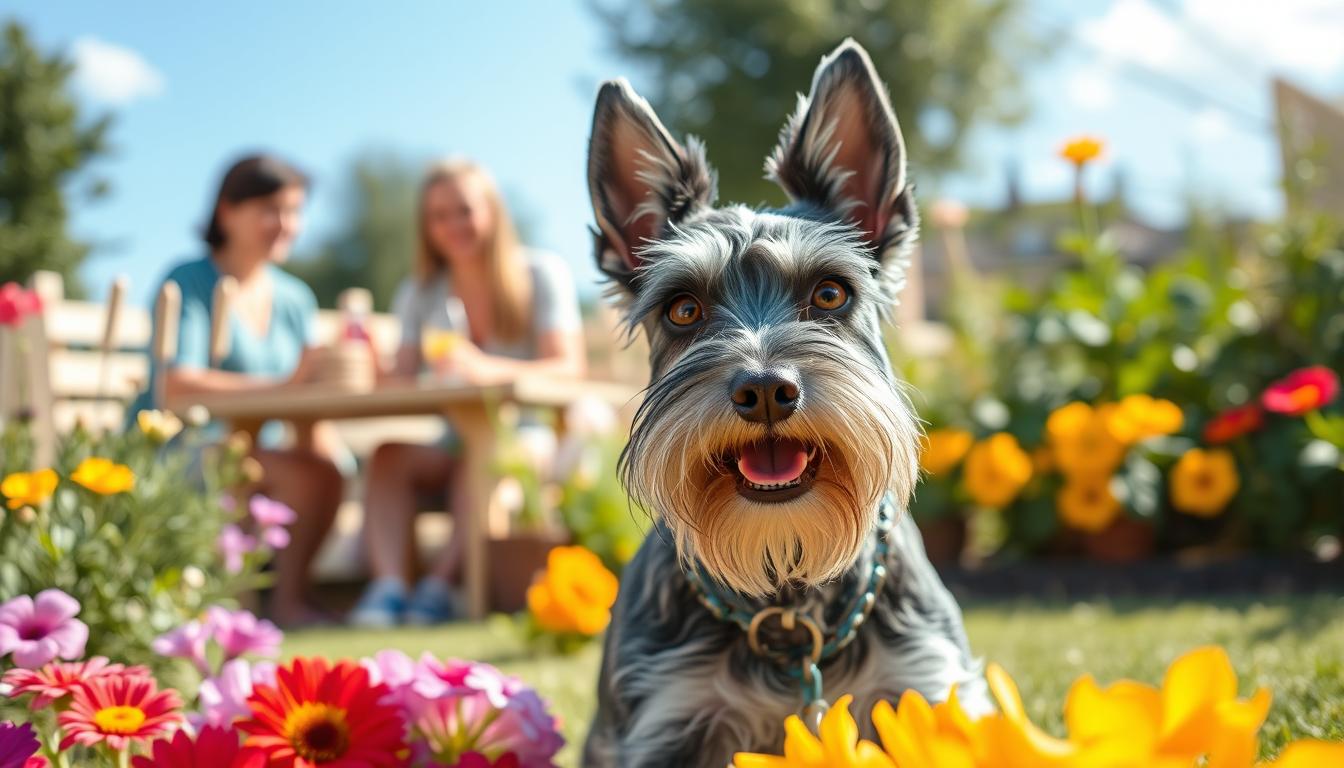The Miniature Schnauzer is a beloved breed known for its loyalty and love for families. They have unique beards and eyebrows, making them a wonderful addition to any home. The Schnauzer breed has a long history, and the Miniature Schnauzer is a favorite among many.
Miniature Schnauzers are great for families because they adapt well to different homes. As part of the Schnauzer breed, they protect their loved ones but are also friendly and outgoing. In this article, we’ll dive into the world of Miniature Schnauzers, covering their traits, care needs, and more.
Key Takeaways
- The Miniature Schnauzer is a loyal and affectionate breed
- They have a distinctive appearance with beards and eyebrows
- The Schnauzer breed has a rich history
- Miniature Schnauzers are versatile and thrive in various living situations
- They are naturally protective but also friendly and outgoing
- Regular care and attention are necessary to keep them happy and healthy
Understanding the Miniature Schnauzer Breed
The Miniature Schnauzer is a beloved breed with a rich history. It’s known for its unique characteristics. To truly appreciate this breed, it’s essential to delve into its origins and development.
With a history spanning centuries, the Miniature Schnauzer has evolved from a working dog to a cherished companion. For those seeking Miniature Schnauzer information, understanding the breed’s history is crucial.
The Schnauzer breed originated in Germany in the 15th century. It was highly valued for its ability to guard property and herd livestock. Over time, the breed gained recognition from kennel clubs, leading to its increased popularity as a companion dog.
Today, the Miniature Schnauzer is renowned for its small size, distinctive beard, and energetic personality. It makes an ideal choice for many families seeking a loyal companion.
Origin and History
The Miniature Schnauzer’s origins are deeply rooted in German farming culture. Initially bred to guard farms and herd livestock, the breed demonstrated exceptional intelligence, loyalty, and protective instincts. As the breed gained recognition, it became a popular choice as a companion dog, cherished for its affectionate and energetic nature.
Breed Recognition
The Miniature Schnauzer has been recognized by numerous kennel clubs, including the American Kennel Club (AKC). This recognition has contributed to the breed’s growing popularity. It has become a staple in dog shows and a beloved companion in many households. For those interested in Miniature Schnauzer information, understanding the breed’s recognition is vital.
Size and Physical Specifications
The Miniature Schnauzer is a small dog breed, typically weighing between 11 and 18 pounds. Its distinctive beard and eyebrows give the breed a unique appearance. With its compact size and energetic personality, the Miniature Schnauzer is an ideal choice for families and individuals seeking a loyal and affectionate companion, and a great example of the Schnauzer breed.
The Distinctive Appearance of Miniature Schnauzers
Miniature Schnauzers are easy to spot because of their unique beard and eyebrows. They are small but strong and agile. Their fur needs regular grooming to keep it looking good.
They come in three colors: salt and pepper, black, and white. Each color variation adds to their charm. This makes them a favorite among dog lovers. Some key traits of Miniature Schnauzers include:
- A double coat that sheds moderately
- A compact, muscular build
- A distinctive beard and eyebrows
- Three color variations: salt and pepper, black, and white
The Miniature Schnauzer’s looks are just one reason they’re great pets. Their mix of looks and personality makes them loved by many. They’re perfect for families and individuals.
Personality Traits and Temperament
Miniature Schnauzers are known for their unique personality traits and temperament. They make great additions to families. Their temperament is a mix of intelligence, alertness, and social nature. This allows them to thrive in various environments.
They are highly intelligent and alert. They love to learn and are naturally curious. This makes them excellent watchdogs, always ready to spot potential threats.
Intelligence and Alertness
Miniature Schnauzers are very intelligent dogs. They need regular mental stimulation to prevent boredom and stress. They thrive on interaction and exercise, making them perfect for active families.
Social Nature
Despite being wary of strangers at first, Miniature Schnauzers are very social. They love to interact with people and other animals. With proper socialization, they become confident and friendly, great for families with children.

Compatibility with Children
Miniature Schnauzers can get along well with children, especially if socialized early. It’s important to supervise interactions between dogs and young children for safety. With their gentle and patient nature, they make great family pets, offering love and companionship to all ages.
Essential Care Requirements
Miniature Schnauzer care includes regular grooming, exercise, and a balanced diet. They need grooming to avoid matting and tangling. This can be done at home or by a professional groomer. A well-groomed Miniature Schnauzer looks great and feels better.
Miniature Schnauzers need daily walks and playtime to stay happy. They should get at least 30 minutes of exercise each day. This can be walks, runs, or playtime in the park or backyard. Regular exercise keeps them physically and mentally healthy.
They also need a balanced diet that’s rich in protein, fiber, and nutrients. It’s important to watch their food intake to keep them at a healthy weight. Here are some key aspects of Miniature Schnauzer care:
- Regular grooming to prevent matting and tangling of their coat
- Daily walks and playtime to stay happy and healthy
- A balanced diet that meets their nutritional needs
By following these care requirements, Miniature Schnauzers can live up to 12-14 years. They make great long-term companions for families. With the right care, they can thrive and become a beloved family member.
Training Your Miniature Schnauzer
Training a Miniature Schnauzer needs a gentle yet firm touch. Being consistent and using positive methods are key. They are smart but can be stubborn. With patience and the right rewards, they learn to obey and behave well.
Focus on basic obedience like sitting, staying, and coming. This builds a strong bond and ensures they’re well-behaved. Socialization is also vital for their confidence and calmness in new places.
Basic Obedience Training
Start basic obedience training early and be consistent. Begin with simple commands like “sit” and “stay.” Use treats and praise to motivate them.
Socialization Tips
Socialization is key for Miniature Schnauzers. It makes them confident and calm in new situations. Introduce them to new people, places, and experiences. This includes walks, dog parks, and meeting friends.
Common Training Challenges
Miniature Schnauzers can be tough to train due to their stubbornness. But, the right approach and rewards can help. Common issues include housebreaking, barking, and chewing.
Follow these tips for consistent training. Be patient and positive, rewarding good behavior. With time and effort, you’ll overcome challenges and enjoy a happy relationship with your Miniature Schnauzer.
Exercise and Activity Needs
Miniature Schnauzers are full of energy and need lots of Miniature Schnauzer exercise to be happy. They need daily walks, playtime, and brain games to avoid boredom and bad behavior. They love activities like agility, obedience training, and hiking too.
To make sure your Miniature Schnauzer gets enough exercise, try these activities:
- Daily walks: at least 30 minutes, twice a day
- Playtime: spend at least 1 hour a day playing with your dog
- Mental stimulation: give puzzle toys and interactive games to keep their mind sharp
With the right Miniature Schnauzer exercise and activities, your dog will be happy and healthy. It’s key to balance physical and mental challenges to keep them from getting bored or destructive.

Every dog is unique, and what your Miniature Schnauzer needs may change. Always talk to your vet to find the best exercise plan for your dog.
Grooming and Maintenance
Miniature Schnauzer grooming is key to their health. Their double coat needs regular brushing to avoid matting. Brushing several times a week helps, especially in areas prone to tangling.
Trimming is also vital. It keeps their beard and eyebrows looking great. These features are what make the Miniature Schnauzer unique.
For more on the breed, check out the Miniature Schnauzer breed guide. It offers insights into their history, personality, and care needs. Grooming can be done at home or by a professional. Many owners like to groom their dogs themselves, using the right tools.
Coat Care Requirements
Miniature Schnauzers need regular brushing, trimming, and stripping. This keeps their coat looking its best. Essential grooming tools include a slicker brush, pin brush, and stripping knife.
Choosing the right shampoo and conditioner is also important. It helps avoid skin irritation.
Grooming Tools and Supplies
Here are some must-have grooming supplies for Miniature Schnauzers:
- A high-quality slicker brush for removing tangles and mats
- A pin brush for smoothing the coat and distributing natural oils
- A stripping knife for removing dead hair and maintaining the breed’s distinctive texture
Using the right tools and supplies keeps your Miniature Schnauzer looking and feeling great. It also strengthens your bond through grooming sessions.
Health Considerations and Common Issues
As a Miniature Schnauzer owner, knowing about health issues is key. Regular veterinary check-ups help prevent or manage problems like hip dysplasia and eye issues. A balanced diet and a healthy lifestyle also play a big role.
Some common health issues in Miniature Schnauzers include:
- Hip dysplasia
- Eye problems, such as cataracts and progressive retinal atrophy
- Autoimmune disorders, such as lupus and rheumatoid arthritis
Knowing the signs of illness is crucial. If you see anything unusual, take your Miniature Schnauzer to the vet right away. By taking care of your pet’s health, you can help them live a long and happy life.
Dietary Requirements and Nutrition
A well-balanced Miniature Schnauzer diet is key for your pet’s health. Choose a high-quality dog food rich in protein, fat, and complex carbs. This is vital for their growth and upkeep.
When picking dog food, think about your Miniature Schnauzer’s age, size, and how active they are. A diet that fits their nutritional needs keeps them energetic and healthy.
Feeding Schedule
Feeding your Miniature Schnauzer regularly helps keep their energy up. It’s best to feed them 2-3 times a day. This depends on their age and how active they are.
Food Types and Recommendations
Different dog foods are out there, like dry, wet, and raw. Pick one that suits your Miniature Schnauzer’s needs and likes. Some good options for a Miniature Schnauzer diet include:
- High-protein dog food
- Grain-free dog food
- Limited-ingredient dog food

Living with a Miniature Schnauzer
Living with a Miniature Schnauzer is incredibly rewarding. They bring joy and companionship to families and individuals. To keep them happy and healthy, it’s key to understand their needs.
This includes regular exercise like daily walks and playtime. It keeps them physically and mentally sharp.
A good Miniature Schnauzer lifestyle also means commitment to training and grooming. Training helps them behave well and strengthens your bond. Grooming keeps their coat looking great and ensures their health.
Some important parts of living with a Miniature Schnauzer are:
- Feeding them a balanced diet that meets their nutritional needs
- Creating a safe and comfy living space
- Regular vet visits for health checks
- Activities that keep their mind and spirit active
By taking on these responsibilities, you can make a loving home for your Miniature Schnauzer. This improves their life and strengthens your bond with them.
While it takes dedication, the benefits are huge. With proper care, Miniature Schnauzers can thrive in many homes. They bring endless joy and companionship to their owners.
Choosing a Miniature Schnauzer Puppy
Deciding to get a Miniature Schnauzer puppy is a big step. It’s important to find a good breeder. This ensures your puppy is healthy and well-socialized. A reputable breeder cares about their dogs’ health and provides a safe place for them to grow.
A healthy Miniature Schnauzer puppy has a shiny coat, bright eyes, and is playful. Spend time with the puppy to see if it fits your family. Ask the breeder about the puppy’s parents, their health, and any genetic tests.
Reputable Breeder Selection
To find a good breeder, ask friends, family, or your vet for recommendations. You can also look up local breed clubs or national associations for breeder lists. When you visit a breeder, check the facility and the dogs’ health.
What to Look for in a Puppy
When picking a Miniature Schnauzer puppy, think about its temperament, energy, and looks. Ask about the puppy’s socialization and training. A well-socialized puppy is confident and curious, getting along with people and other animals.
By researching and choosing a reputable breeder, you’ll get a happy and healthy Miniature Schnauzer puppy for your family.
Cost of Ownership
Thinking about getting a Miniature Schnauzer? It’s key to know the costs involved. The first expenses include the puppy’s price, setting up your home, and vet care. Then, there are ongoing costs like food, vet bills, and supplies.
Initial Expenses
The first costs for a Miniature Schnauzer can be from $500 to $2,000. This depends on the puppy’s lineage, age, and health checks. You’ll also need to pay for vet care, like shots and spaying/neutering, which is about $500 to $1,000.
Ongoing Costs
Monthly food costs for a Miniature Schnauzer are $50 to $75, based on quality and amount. Annual vet care, including check-ups and prevention, is $500 to $1,000. Other yearly expenses, like toys, treats, and grooming, can be $500 to $1,000.
It’s important to plan your budget to care for your Miniature Schnauzer. Knowing the costs helps you prepare for a happy and healthy life with your new pet.
Creating the Perfect Home Environment
Creating a comfy and safe home for your Miniature Schnauzer is key. They need a cozy spot to rest, like a crate or bed. Also, make sure your home is dog-proofed to avoid accidents.
To make a great home for your Miniature Schnauzer, think about these:
- Provide a secure yard or exercise area for regular exercise and mental stimulation
- Ensure your home is free from hazards, such as toxic substances and electrical cords
- Create a comfortable and quiet space for your Miniature Schnauzer to rest
For more tips on creating a comfy home for your Miniature Schnauzer, check out the Orvis website. They have lots of advice on caring for Miniature Schnauzers.
By following these tips, you can make a happy and healthy home for your Miniature Schnauzer. They’ll get the comfort, safety, and stimulation they need to do well.
Socializing Your Miniature Schnauzer
Socialization is key for a Miniature Schnauzer’s growth. It makes them confident and calm in new places. You should introduce them to different settings, people, and animals to teach them social skills.
Start socializing your Miniature Schnauzer early and keep it up. Take them on walks, to pet stores, and let them meet other dogs and people. This helps them learn to interact well.
With Other Pets
It’s important to socialize them with other pets, like dogs, cats, and animals. You can do this in a safe place, like a training class or pet park. This way, they learn to get along with others.
With People
It’s also vital to socialize them with people. This makes them comfortable around strangers and in new places. Take them for walks, visit public spots, and introduce them to new faces.
By following these tips, your Miniature Schnauzer will become a great companion. Always be patient and consistent. Reward them with treats and praise for good behavior.
Why the Miniature Schnauzer Makes the Perfect Family Companion
The Miniature Schnauzer is a great pick for families wanting a loyal, smart, and loving pet. These small dogs love being around people and make any home happier. They are playful and very devoted, becoming a favorite in the family.
Miniature Schnauzers are also very flexible and can live in different places. They do well in big houses or small apartments, as long as they get enough attention and exercise.
They have great senses and are protective, making them good watchdogs. But they are also gentle and great with kids, making them perfect for families of all ages.
In short, Miniature Schnauzers are loyal, smart, and easy to adapt, making them ideal family pets. With the right care and love, they bring endless joy and companionship to any family.
FAQ
What is the origin and history of the Miniature Schnauzer breed?
The Miniature Schnauzer started in Germany in the 15th century. It was a farm dog, guarding property and herding livestock. Over time, it became popular and was recognized by kennel clubs.
What are the distinctive physical characteristics of Miniature Schnauzers?
Miniature Schnauzers are known for their beard and eyebrows. They have a double coat, soft undercoat, and harsh outer coat. They come in salt and pepper, black, and white colors.
What is the temperament and personality of the Miniature Schnauzer?
Miniature Schnauzers are smart and alert, making them great watchdogs. They love people and are good with families. But, they can be shy around strangers and need time to get used to new people.
What are the essential care requirements for Miniature Schnauzers?
They need regular grooming to avoid coat problems. They also need daily walks and playtime. A good diet is key to their health.
How should Miniature Schnauzers be trained?
Training them needs patience and positive methods. Teach them basic commands and socialize them well. This helps them feel confident and calm.
What are the exercise and activity needs of Miniature Schnauzers?
They are energetic and need lots of exercise. Daily walks, play, and mental games are important. Activities like agility and hiking are great too.
What are the grooming and maintenance requirements for Miniature Schnauzers?
Their double coat needs regular brushing and trimming. Professional grooming is best, but owners can learn to groom them at home.
What are the common health issues and considerations for Miniature Schnauzers?
They can get hip dysplasia, eye problems, and autoimmune issues. Regular vet visits, a good diet, and a healthy lifestyle can help prevent or manage these.
What are the dietary requirements and nutrition needs for Miniature Schnauzers?
They need a balanced diet rich in protein, fat, and carbs. Choose a high-quality dog food based on their age, size, and activity level.
What should potential owners consider when choosing a Miniature Schnauzer puppy?
Look for reputable breeders who care about their dogs’ health. Consider the puppy’s temperament, energy, and physical traits when choosing.
What are the initial and ongoing costs of owning a Miniature Schnauzer?
Owning a Miniature Schnauzer can cost a lot. Initial costs include buying a puppy and setting up a home. Ongoing costs include food, vet bills, and supplies.
How can owners create the perfect home environment for a Miniature Schnauzer?
Make their home comfortable and safe. Provide a cozy place to rest and dog-proof your home. A secure yard or area is needed for exercise and mental stimulation.
How important is socialization for Miniature Schnauzers?
Socialization is key for Miniature Schnauzers. It helps them be confident and calm in new situations. Socialize them with other pets and people to help them develop good social skills.
Why is the Miniature Schnauzer considered a perfect family companion?
Miniature Schnauzers are loyal, smart, and loving. They are great with families and love to be around people. With proper care, they can bring joy and companionship to your family for years.

